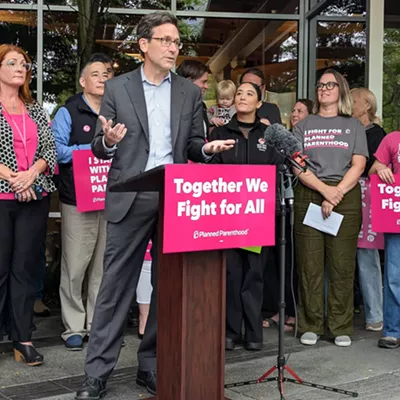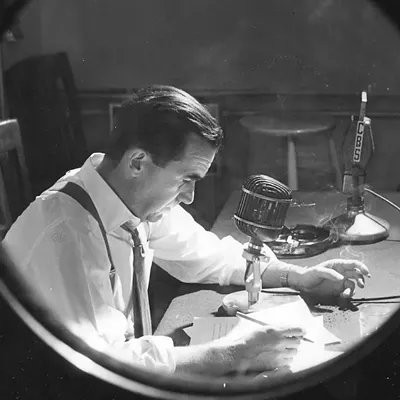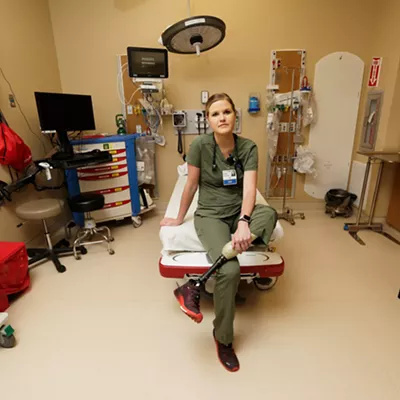Perhaps the best chance for replacing a surface-level parking lot on Spokane Falls Boulevard is just across from the Opera House. When the Spokane Public
Facilities District chose the east site over the south site for the convention center expansion project, many downtown boosters were upset. They had hoped conventioneers would have been closer to the downtown action. But that decision seems to have a silver lining.
The PFD could be the key to redeveloping that block with a mix of uses, from parking to retail to housing. In the process, the PFD could really upgrade the environs of the Opera House.
"It would be really nice to have a continuity of shopping and activity," says Jeff Warner, an architect at ALSC who has developed unofficial plans for the block, "to tie it to River Park Square and to the rest of downtown."
"We'd like to restore a very urban character to those blocks through viable uses, and the ones we think of now are downtown housing," says Mike Edwards, president of the Downtown Spokane Partnership.
ALSC's vision for the block includes street-level retail and as many as 100 units of housing on top at the northwest corner, overlooking Riverfront Park.
One requirement on the block -- and this is where the PFD comes in -- is parking. The east expansion does not include adequate parking, and PFD Executive Director Kevin Twohig says that, ideally, additional parking on the south site would come online in early 2007, just as the convention center is opening.
"The PFD is in a learning mode and a kind of wait-and-see," says Twohig. "What should our role be and what should other people's roles be? We don't have the money to do it all, but some of our board members are focused on figuring out [how we can participate]."
The PFD could be a powerful force in whatever happens along Spokane Falls Boulevard. When the financing for the expansion project was first set up, the county commissioners, led by Kate McCaslin, pushed for a conservative plan, based on zero percent annual growth. That kept the project's price tag tight, but over the course of the next 30 years, it could make the PFD a very wealthy organization, by local government standards. It's a certainty that the county will grow at some point -- even a modest growth rate should allow the PFD to pay off its construction bonds and enjoy financial windfalls. Officially, that money is for the maintenance and operation of the public facilities it manages. So it becomes a question of how expansive the PFD views its mission.
"It's not going to be as expansive as some folks hope," says Twohig. "We're a single-purpose district, but we can do parking."
But what if the PFD decides that a connection from the Opera House to downtown is part of the mission? Or a plaza somewhere on the block? Could it then maintain those common areas?
"We've got a board that is of a mind that we can be a catalyst for a bigger project," says newly appointed PFD board member Larry Soehren. "Not own it, but help make it happen.
"There's a new sense of openness about what we're doing," he adds, "and openness to working with others on this south site."
One of those the PFD may work with is architect Glen Cloninger, who owns and represents owners of half the block. The parcel's ownership also includes the city of Spokane and Diamond Parking.
Cloninger's concept, which has been presented to the PFD, includes two levels of parking, with retail at the street level. But his innovation is a connecting corridor that runs diagonally across the block from the Opera House to the corner across the street from Auntie's bookstore.
"Retail demand is there," says Cloninger, "and this creates a front door to downtown."
The structure also features a wide connector at the skywalk level to cross Spokane Falls Boulevard. And it would allow for more levels of parking to be added if necessary, along with more meeting space. The PFD is expecting to need more space someday -- perhaps as much a 150,000 more square feet of space.
But whether the PFD will become a willing partner remains to be seen. In its first incarnation, as the manager of the Spokane Arena, the PFD Board was devoted to its one property and not much interested in anything else. This led to a well-run facility, but it took a lot of convincing to even get the Board to look at taking over the convention center. With its own revenue stream and a special state tax rebate for the taking, the PFD was the obvious choice and it ultimately did take on the task.
Designed to operate apolitically, with board members appointed by the city, the county and the hotel and restaurant industries, the all-business approach became more apparent as the stakes grew. The PFD did participate in a successful first-time vote on the expansion, but it drew criticism for its preference for meeting outside the media's glare. Its choice of location for the expansion was unpopular, and the organization seemed ill-equipped to defend its decision, even though it was based on sound principles. Being apolitical turned out to be a virtue in some ways, but in others it made things more difficult.
Not surprisingly, when the PFD announced plans to relocate Azteca to the corner of Main and Washington, it was met with strong opposition. The proposal, which also guaranteed parking, would have carved up the block, limiting future plans. To its credit, the board did react to the outcry and reversed itself. Now the block is one big open lot (except for one old building soon to be home to the Boulevard restaurant), giving architects and planners maximum flexibility.
Today the Board is almost entirely new, with Rick LaFleur the only holdover from the Arena-only days. New to the board are three real estate professionals: Soehren is a property manager and commercial broker; Tom Power manages the Fernwell Building; and Mick McDowell is a developer whose latest project is American West Bank building on Browne. Sandy McCauley, a north Spokane business owner, is the fifth member of the board.
"The board has always been open to listening, but up until the end of the year, they were just focused on the convention center getting open," says Twohig. "This new board is saying, 'OK, it looks like the convention center is happening, so what's next?' "
Publication date: 06/17/04



















